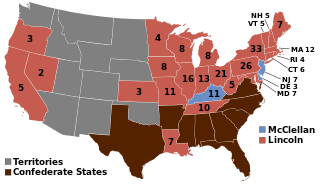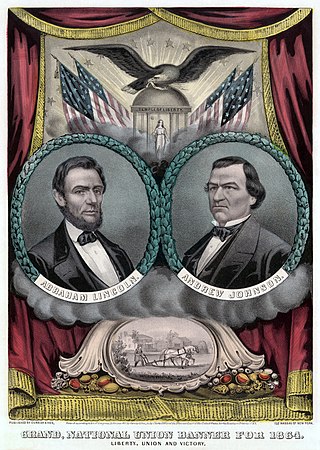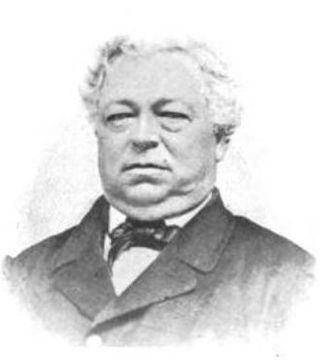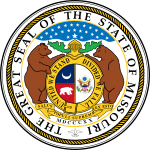
The 1864 United States presidential election was the 20th quadrennial presidential election. It was held on Tuesday, November 8, 1864. Near the end of the American Civil War, incumbent President Abraham Lincoln of the National Union Party easily defeated the Democratic nominee, former General George B. McClellan, by a wide margin of 212–21 in the electoral college, with 55% of the popular vote. For the election, the Republican Party and some Democrats created the National Union Party, especially to attract War Democrats.

Horatio Seymour was an American politician. He served as Governor of New York from 1853 to 1854 and from 1863 to 1864. He was the Democratic Party nominee for president in the 1868 United States presidential election, losing to Republican Ulysses S. Grant.

The 1856 Republican National Convention was a presidential nominating convention that met from June 17 to June 19, 1856, at Musical Fund Hall at 808 Locust Street in Philadelphia, Pennsylvania. It was the first national nominating convention of the Republican Party, founded two years earlier in 1854. It was held to nominate the party's candidates for president and vice president in the 1856 election. The convention selected former John C. Frémont, a United States Senator from California, for president, and former Senator William L. Dayton of New Jersey for vice president. The convention also appointed members of the newly established Republican National Committee.

The National Union Party was the name used by the Republican Party and elements of other parties for the national ticket in the 1864 presidential election during the Civil War. Most state Republican parties did not change their name. The name was used to attract War Democrats, border state voters, and Unconditional Unionist, and Unionist Party members who might otherwise have not voted for Republicans. The National Union Party nominated incumbent Republican President Abraham Lincoln of Illinois and Democrat Andrew Johnson of Tennessee for Vice President. They won the Electoral College 212–21.

James Madison Wells was elected Lieutenant Governor and became the 20th Governor of Louisiana during Reconstruction.

The 1860 Missouri gubernatorial election was held on August 6, 1860, and resulted in a victory for the Democratic nominee, Claiborne Fox Jackson. Jackson defeated the nominee of the Constitutional Union Party, Sample Orr, and Southern "Brekenridge" Democrat Former Gov. Hancock Lee Jackson to become the fifteenth governor of Missouri. Republican James B. Gardenhire also ran in the election, but received a negligible number of votes.

The 1864 United States elections were held on November 8, 1864. National Union President Abraham Lincoln was elected to a second term, while the Republicans added to their majorities in Congress. The elections were held during the American Civil War. Lincoln would be assassinated shortly into his second term.

The 1922 United States Senate election in Montana took place on November 7, 1922. Incumbent United States Senator Henry L. Myers, who was first elected to the Senate in 1910, and was re-elected in 1916, declined to seek re-election. Former United States Attorney Burton K. Wheeler won the Democratic primary and advanced to the general election, where he faced Carl W. Riddick, the United States Congressman from Montana's 2nd congressional district and the Republican nominee. Ultimately, Wheeler defeated Riddick comfortably and won his first term in the Senate.

The 1872 United States presidential election in Texas was held on November 5, 1872, as part of the 1872 United States presidential election. State voters chose eight electors to represent the state in the Electoral College, which chose the president and vice president.

The 1877 New Jersey gubernatorial election was held on November 6, 1877. Democratic nominee George B. McClellan, who was the national Democratic Nominee in 1864, defeated Republican nominee William A. Newell with 51.65% of the vote.

The 1896 United States presidential election in Iowa took place on November 3, 1896. All contemporary 45 states were part of the 1896 United States presidential election. Voters chose 13 electors to the Electoral College, which selected the president and vice president.

In the 1864 U.S. presidential election, the Democrats nominated Union Army General George McClellan for U.S. President and Ohio U.S. Representative George Pendleton for U.S. Vice President. During the campaign, McClellan vowed to do a better job of prosecuting the Union Army effort in the American Civil War than incumbent U.S. President Abraham Lincoln did. Ultimately, the McClellan-Pendleton ticket lost to the National Union ticket of Abraham Lincoln and former U.S. Senator Andrew Johnson.

The 1864 Michigan gubernatorial election was held on November 8, 1864. Republican nominee Henry H. Crapo defeated Democratic nominee William M. Fenton with 55.15% of the vote.

The 1872 Indiana gubernatorial election was held on October 8, 1872. Democratic nominee Thomas A. Hendricks defeated Republican nominee Thomas M. Browne with 50.12% of the vote.

The 1864 Indiana gubernatorial election was held on October 11, 1864. Incumbent Republican Oliver P. Morton defeated Democratic nominee Joseph E. McDonald with 53.72% of the vote.

The 1864 Connecticut gubernatorial election was held on April 4, 1864, and the first of two gubernatorial elections in which the Republicans adopted the National Union Party name, as the national party had done during the 1864 presidential election. Incumbent governor and National Union nominee William Alfred Buckingham defeated Democratic nominee Origen S. Seymour with 53.65% of the vote.

The 1876 North Carolina gubernatorial election was held on November 7, 1876. Democratic nominee Zebulon Baird Vance defeated Republican nominee Thomas Settle with 52.83% of the vote.

The 1864 Vermont gubernatorial election for governor of Vermont took place on September 6. Incumbent J. Gregory Smith was a candidate for reelection to a second one-year term, in keeping with the provisions of the Republican Party's "Mountain Rule". The Democratic nominee was Timothy P. Redfield, a former member of the Vermont Senate, the Free Soil Party's 1851 nominee for governor, and the Democratic nominee in 1863. In the general election, the Republican Party's dominance of Vermont politics continued, and Smith was easily reelected.

The 1863 Vermont gubernatorial election for governor of Vermont took place on September 1. In accordance with the Republican Party's "Mountain Rule", incumbent Frederick Holbrook was not a candidate for reelection. The Republican nominee was J. Gregory Smith, the Speaker of the Vermont House of Representatives. The Democratic nominee was Timothy P. Redfield, a former member of the Vermont Senate and the Free Soil Party's nominee for governor in 1851. In the general election, the Republican Party's dominance of Vermont politics and government continued, and Smith was easily elected to a one-year term.

The 1864 New Hampshire gubernatorial election was held on March 8, 1864.



















